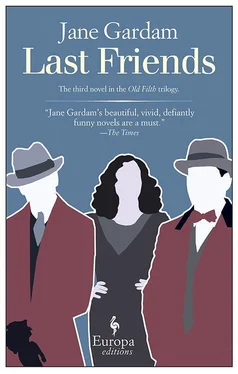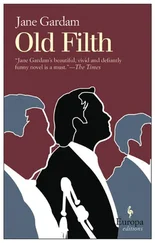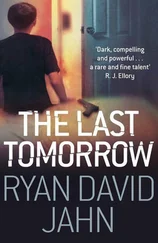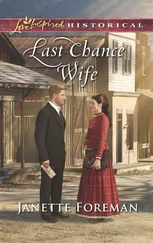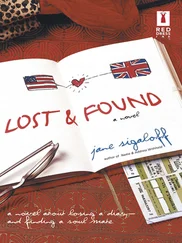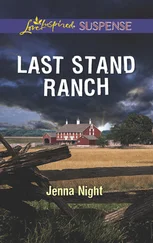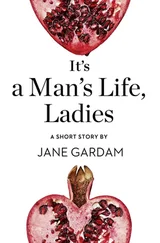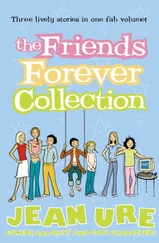‘Well there you are then,’ said Michael, ‘It’s a funny old world. What you think of this? Look up, now.’
Hanging on wires from the museum’s roof glimmered a painted wooden banner, pale green and gold. Trailing squirls and tendrils of delicate foreign flowers surrounded lettering she couldn’t decipher.
‘It’s wonderful. What is it? What does it say?’
‘Nobody can make out. But it’s not that old.’
‘It looks almost Classical.’
‘No. It was something from Muriel Street. The street was flattened with a bomb and this thing somehow survived.’
‘It looks as old as The Odyssey.’
‘Aye, it’s odd all right. Kind of sadness in it too. Horrible back-alley it hung in. They used to slaughter cattle there on a Thursday.’
She looked at him. ‘I’m not a complete ingénue , Michael.’
‘The guy painted that,’ said Michael, ‘wasn’t no jane-you neither. He was like a god. But he was broken up. He was that Vanetski’s dad. The Russian spy.’
‘I’m out of my depth, Michael.’ She took his arm.
‘Who isn’t?’ said Michael.
* * *
‘And,’ she said back in the car, ‘you’ve lived here all your life? How very interesting.’
‘I’ve had some foreign holidays. Now, before we set off back, tek a look down there. Look around.’
‘Sea?’ she said. ‘It’s rather pale — if you saw the Caribbean, Michael. . ’
‘Look along the coast-line. Right? All ripped off in the war. The big raid took the heart out of it. See that yellow house with the black holes for windows? Never re-built. Streets of little dwellings down the old high street. All gone. I never seed ‘em. Ripped away like the flounce on a skirt, me auntie says. Bessie. She’s still alive. D’you want to meet her?’
‘Well, I think we should get back.’
‘You’ve to see Grangetown. Ugliest place, it’s said, in Europe. Covered in red dust off the old ironstone works. It crosses the sea on the wind. They say Denmark’s covered in it too. It’s on a level with Ayres Rock Australia. D’you know, they used these beaches for filming D-Day? In that film. Nowhere in France poor enough. No. 326 Palm Tree Road, here’s auntie’s. She’s near a hundred, too. I’ll get her.’
Dulcie sat alone in the car. The long, long street of red houses was by no means derelict or poor but it was lifeless. Re-built since the war, dozen after dozen, all alike. Well-kept, anonymous, identical. Curtains were pasted against the windows. No-one to be seen. Concrete and weeds in the long, long vista of tiny front gardens. Silence. No people. Then a boy with small eyes came up beside the car and spat at it.
After a while a shuffling old man with a dog appeared, stopping and looking, looking and stopping. He put his face near hers at the passenger window and said through the glass, ‘Is it Lilian?’
‘No, I’m Dulcie.’
‘I’m looking out for our Lilian. She’s seldom coming by.’
‘I’m sorry.’
‘I’d say the Germans have her.’
‘That was a very long time ago.’
‘Behind that Iron Curtain.’
‘That was a long time ago, too.’
‘No, it were yesterday. Not even the blacks come here, you know. Too dismal for ’em. Our Lilian was a grand girl.’
Michael came down his aunt’s concrete path, ignored the old man and said Dulcie was to come in. ‘And you get on with your walk,’ he said to the man.
‘Michael, this old man is crying. For his sister.’
‘Oh aye. Lilian. Half a century on. Killed in Middlesbrough. Shut up now, George. There was worse going on than Lilian. What about the Concentration Camps?’
‘It’s all stood still,’ said the old man.
‘Aye, and that’s the trouble,’ said Michael.
As Dulcie pulled on her little mohair gloves as she walked up the path the old man shouted, ‘It was wireless won us t’war. If it had been only bloody television we’d have lost it and mebbe got some soul back in us. It went out, did soul, with Churchill. We was all listening to him when the Dorniers come that night.’
A woman was watching them from the door-step.
‘Are you comin’ in then?’
* * *
She didn’t look a hundred, she looked fifty and very alert.
‘Friends o’ Terry’s? Terry Vanetski? Cup o’ tea?’
‘I’m afraid Terry is gone,’ said Dulcie, drawing off her gloves, Bessie watching, stretching over and taking one and stroking it. ‘I went to his memorial service. He died in Malta.’
‘What in heck was he doing there? He was that restless. Is’t true he married a Chinese?’
‘Yes. Elsie. I hardly knew her. . ’
‘Now then tell us. One thing we can still do here is talk. I wonder if she was like his mother, Florrie. Now she was a fine woman, like a man. With a back-to-front man’s cap. Here’s your tea and a fancy. It’s only shop.’
‘They — didn’t exactly get on. Terry and Elsie.’
‘Then there’d be someone else. Terry was born to love women. Serviette? You can’t see where he lived. Nowt left. Nowt much left of Florrie neither nor the Russian. Eighty-seven killed that night. Terry was out of it you know because they’d put him on some getaway-train that afternoon. He left without a tear. I helped get his mother home where she’d been waving at the train from the fence. Oh, she was a fine woman. She never knew if he’d seen her waving.’
‘And you’ve never moved away?’
‘Well, bus-trips with Michael, in a club, to foreign parts but I can’t recommend them. Up here’s better, even with the drugs and the knives — even in Turner Street! Turner Street where the doctors used to live and the manager of the Co-op. Even now it’s better than the Costa del Sol where you can’t understand a word they say. All those fat English women, they’re a disgrace. I was maid at a posh school here once you know. That was a nasty place, but interesting and you never saw anything like that Mrs. Fondle in her purples and satins. She fancied young Terry. Yes she did. Just as well she got drowned. There was tensions all right, what with Mrs. Fondle and circus performers and spies and coal-carts — bit of Dundee? I mek me own Dundee.’
‘It must have been a very — vivid — time,’ said Dulcie. ‘I was in Shanghai about then. It was really my country. I don’t know why we were all so mad on this one we’d never seen.’
‘I’d not think Shanghai would have been all water-lilies and flowers-behind-the-ear neither. But, like wherever you go, there’s great compensations. Great people.’
‘Oh — yes.’
‘Like Mr. Parable in Herringfleet. Now he was mad. He was what’s called a religious maniac but he was one of the nicest men you could hope to meet. I wonder where his money went?’
‘And then,’ she said, ‘there was that Mr. Smith. He had a son, too. Tight-up little chap. Never very taking. Father took no note of him but they say he did well, mebbe better than Terry. But yet, with little Fred, nobody ever seemed to take to him.’
‘Yes. I see. It’s another world to me you know. You make me feel very narrow Mrs.—’
‘Miss,’ she said. ‘Thank God.’
There was a silence, Dulcie thinking of all the countries she had lived in where nobody now cared for her one jot, Bessie thinking of the children of this grey place who had shone here once. ‘Did you say our Terry’s gone ?’ she asked and Dulcie said again she had been to his memorial service. ‘We don’t go in for that round here,’ said Bessie, ‘whoever you are. It’s York Minster if you’re someone, but otherwise it’s Mr. Davison at Herringfleet church digging a hole. And we don’t go for these basket-work caskets neither. Remind you of the old laundry down Cargo Fleet. I suppose little Fred’s gone too.’
Читать дальше
